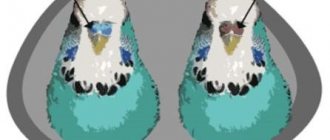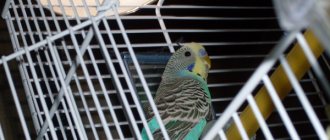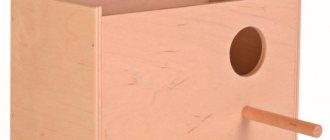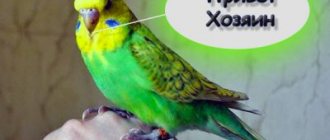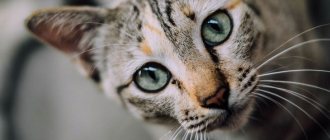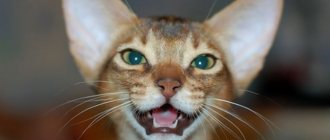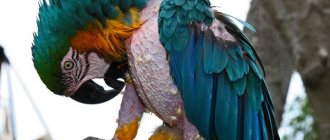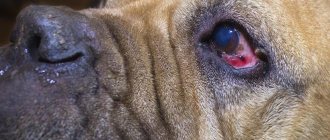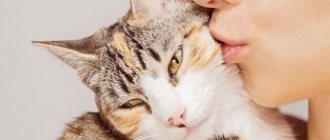Why does a parrot lose feathers?
There are many reasons that lead to a parrot going bald. Some of them are related to normal avian physiology and do not require owner intervention. However, most cases of sudden shedding of feathers indicate a disease in the bird. Sometimes it is possible to prevent further deterioration of the condition by changing the conditions in which the pet is kept and fed. Some illnesses require a visit to the veterinarian.
The main reasons why a parrot may go bald:
- natural shedding;
- avitaminosis;
- French molt;
- shock molt;
- parasitic diseases and infections;
- self-plucking;
- hormonal problems;
- microclimate disturbance.
The owner must be able to distinguish between conditions caused by different factors in order to know when it is not necessary to interfere with natural processes, when you can solve the problem on your own, and when you should contact a specialist.
Natural shedding
If your parrot's feathers have fallen out, this may mean that natural seasonal molting has begun. It goes away for the first time when the chicks reach the age of 3-5 months. At this time, juvenile down changes into adult feathers. A complete change of plumage lasts about 2 months; At this time, parrots can become aggressive and irritable, but after the process is completed, their behavior returns to normal. Adults usually molt 2 times a year - in spring and autumn; the process usually takes about 30 days. At the same time, the feathers fall out evenly, and new feathers immediately grow in their place; There are no areas of baldness.
Avitaminosis
One of the reasons why budgies go bald is due to a deficiency of vitamins and minerals. If a parrot's head goes bald, this indicates a lack of vitamins A and B in its body. In this case, the bird mainly loses feathers on its head, around the eyes and beak. With a lack of elements such as calcium, phosphorus and silicon in the diet, the parrot's feather cover becomes loose, dull and unviable, falls out easily and grows back slowly. Therefore, it is important to feed your pets a varied diet, including fresh vegetables, fruits and herbs, as well as vitamin and mineral supplements.
French molt
French molt is a serious disease that cannot be cured. It is characterized by the fact that the parrot loses feathers from its tail and wings (flight feathers, tail feathers). The bird loses the ability to fly and moves only on the floor. This disease manifests itself in chicks at the age of 3-4 months. Lost feathers may grow back, but then fall out again. The causes of French molt are not entirely clear. The disease is believed to be hereditary; in addition, it can develop with an excess of vitamin A and a deficiency of protein in the diet, as well as as a result of infectious diseases suffered at an early age.
Shock shedding
The cause of shock molting is severe stress. Budgerigars are quite sensitive birds, and many events can cause them shock. Sharp and loud noise, catching with hands and rough handling, placing another bird in the cage, changing the owner can lead to the pet starting to go bald. During shock molting, the parrot's feathers fall out in clumps, leaving large bald spots. A bird can lose both small covert feathers and large ones - tail feathers and flight feathers. After eliminating the stress factor, baldness stops and the feathers grow back.
Parasites and infections
One of the most dangerous reasons why a parrot loses feathers is infection with parasites (mites, feather eaters) or pathogenic fungi. In this case, the bird experiences severe discomfort, loses appetite, and scratches its skin. As a result, signs of inflammation, peeling, wounds and ulcers appear on the skin. Feathers become disheveled, unkempt, and brittle. When infested with mites, the back and neck most often become bald, and when there is an infestation of downy feather eaters, you may notice that the parrot has no feathers under its wings or on its belly. If left untreated, the bird may lose its plumage completely.
Self-plucking
Parrots tend to pluck their own feathers due to stress and strong emotional experiences. Self-plucking can result from:
- lack of attention from the owner;
- lack of toys, boredom;
- severe fear or constant stress;
- loud noises, sharp sounds;
- change of owner or place of residence;
- the arrival of a new family member or pet.
By plucking feathers, the parrot is trying to calm and entertain itself or attract the attention of a person. To cope with this problem, you need to create a calm environment around the bird’s cage and give the pet as much attention as possible.
Hormonal imbalances
If the owner notices that his budgerigar is without feathers, this may indicate hormonal imbalances in the bird. Most often they are observed in mature individuals, which are kept alone. Excess protein and sprouted grains in the diet provokes increased production of sex hormones. If a bird fed this diet is not allowed to breed, it will begin to lose its feathers. Baldness is also observed when the pituitary gland and thyroid gland are malfunctioning. At the same time, the growth of feathers slows down, and bald spots appear on the body. After appropriate treatment with hormonal drugs, the plumage is restored.
Microclimate
Often the cause of baldness is poor maintenance and improper microclimate in the room where the bird lives. Feather loss can be caused by:
- crowding, as a result of which the parrot rubs against the bars of the cage;
- dry air and too high room temperature;
- lack of water procedures;
- irregular cleaning, dirt in the cage;
- poisoning by toxic substances - tobacco smoke, aerosols;
- insufficient or excessive lighting, incorrect selection of lamps;
- allergic reactions to filler or food.
After eliminating unfavorable factors, the plumage is usually restored.
Fungi and parasites
If you want to know why a parrot itches or its feathers fall out in large quantities, then look at the condition of the fallen feather.
If you notice particles of blood or various kinds of holes in any part of it, as well as damage to the beak and paws, or you see wounds or peeling on your bird’s delicate skin, you should sound the alarm. Your budgie may have become a victim of parasites or fungi.
You should immediately consult a doctor to identify the type of parasite. If fungi or downy parasites are detected in parrots, treatment will necessarily be medicinal.
The tick tick is very dangerous for your pet if it is not eliminated in time. Therefore, be sure to isolate your feathered friend from others and follow all doctor’s instructions for a complete recovery and to avoid further relapses of this problem.
Those birds that are visually healthy will also have to be treated prophylactically, since, most likely, they are also already sick.
Treatment and prevention
If your budgerigar's feathers are falling out, you need to carefully examine it to determine the cause of this phenomenon. If the feathers fall out evenly and there are no bald spots on the body, then it is time for seasonal molting, and human intervention is not required. If the bird has become lethargic, has lost its appetite, and the feathers fall out in tufts, leaving bald patches, you should consult a veterinarian to determine the cause of the baldness.
Treatment for your pet depends on the diagnosis. Sometimes it is enough to normalize the living conditions and diet, pay more attention to the pet, or place a partner of the same species with it. In other cases, treatment with hormonal, antimicrobial, antiparasitic and other medications may be required.
To prevent loss of plumage, you must comply with all requirements for keeping and feeding the bird and properly care for it. The cage should be spacious so that the parrot can move freely around it and not touch the walls with its wings and tail. It is located in a room with good ventilation, away from heating devices and noise sources. The diet should be varied and include vitamin and mineral supplements. The owner should spend as much time as possible interacting and playing with the bird; To keep her from getting bored, toys are placed in the cage. The parrot's home is regularly washed and disinfected to prevent the proliferation of fungi and parasites.
Poor nutrition and vitamin deficiency
If your parrot's feathers fall out regularly, then the problem lies in the wrong diet. Often, in order to save money, owners buy cheaper food for parrots, and this is a direct threat to them.
The benefits of such nutrition are minimized. Such foods are aimed simply at filling the stomach; their composition is monotonous and meager.
In this case, you should change the bird’s menu, enriching it with various types of cereals, fruits, vegetables, herbs, and provide for the parrot’s regular consumption of vitamins and minerals, because the state of its health directly depends on this.
Budgerigar shedding caused by diseases
- Lack of vitamins
If the bird is not fed in a balanced manner, it will lack the necessary substances for growth and development. As a result, the budgerigar's feathers fall out profusely. To avoid this, you need to carefully care for your pet and add missing microelements and vitamins to the diet.
- Hormonal imbalances
In this case, only a doctor can help. Problems with the thyroid gland and pituitary gland are not common in parrots and important symptoms are weight loss, darkening of the tips of feathers and dulling of the pet's plumage.
Budgerigars react sensitively to sudden noise and the appearance of a new owner. This often causes feathers to fall out of her tail. At this time, you should try to protect the bird from drafts and talk to him more in a calm voice. It is advisable to include foods that stimulate feather growth in your diet. These are cabbage leaves, egg shells and special vitamins. R
- Diseases caused by fungi and mites
They are very dangerous for parrots. Fungi and mites, when they get on the bird’s skin, begin to parasitize it, and as a result, the budgerigar’s feathers fall out, the skin peels off, and various growths and wounds appear. If these symptoms appear, check the feathers.
Ticks gnaw out small holes at the base, and the shafts of fallen feathers are often covered in blood. We urgently need to take the bird to the veterinarian. You cannot help a parrot on your own. The doctor will prescribe an ointment that needs to be used for several months. Most often in this case, aversectin ointment is prescribed. .
Before stopping treatment, make sure that the disease has really subsided.
People recommend the cheapest and most accessible remedy - Vaseline oil. This is an oily liquid in a dark glass bottle, usually found in any large pharmacy or pharmacy. However, this is not a very good remedy: despite being harmless to the parrot, it does not kill mite eggs, which means that constant relapses of the disease are possible.
Treat the cage itself and toys with Neostamazan (400 ml ampoule of water), and then rinse thoroughly in clean water, pour boiling water over it and dry.
- French molt
A serious disease that causes young parrots to lose their wing feathers. As a result, they cannot fly independently and move on their paws. It is not known for certain what causes this. But if you follow all the doctor’s instructions, carefully care for the bird and feed it properly, the feathers will grow back and the parrot will recover.
- Contact with a down-eater
Down eaters are similar to lice. They can be infected from free birds, or through contact between sick and healthy birds.
They, the so-called ectoparasites, cause a lot of inconvenience to the parrot. Birds bite, gnaw feathers, crawl over the body, causing the pet to constantly itch, pluck itself, and chew its skin.
Infestation with down-eaters reduces appetite, the parrot looks lethargic, with dull, nondescript plumage. If timely treatment is not started, the bird's head and belly may be left without feathers, and even die. To get rid of these parasites, the parrot must be treated with special medications prescribed by the doctor.
The most commonly prescribed aerosols for treating feathers are Insektol, Arpalit, and Celandine spray. The pet is sprayed from a distance of 15-20 cm, for 1-2 seconds, avoiding the eyes, nose, beak and ear canal. In case of severe damage, you can pick up the pet and treat it generously. Repeat after 7-10 days.
And the safest is the imported product Exner Petguard. It uses lactic acid instead of poison. It has a negative effect on the respiratory organs of parasites, but does not harm the pet.
French molt
At the last place in the list of reasons given in this article why your feathered fidget may begin to lose its plumage is French molt.
This disease has not yet been sufficiently studied, as well as methods of counteracting the disease. However, we can say with confidence that this is one of the most difficult reasons that is not so easy to cope with.
It is generally accepted that this disease is caused by insufficiently balanced pet food. In particular, the absence or low content of protein in food.
This conclusion was made due to the fact that only one or a couple of chicks from the entire brood may suffer from this disease. At the same time, if you provide them with high-quality and balanced food, then there is a high probability that their feather cover will soon return to normal.
I would like to draw your attention to the fact that French molt affects mainly young individuals who have not yet managed to leave their native nest, or some time after that.
Shedding
Surely each of you knows that budgerigars and other species of birds are subject to the process of replacing old plumage with new ones throughout the year. There is nothing scary in this process. Rather, on the contrary, your pet will be transformed and will look like new.
Thus, systematic feather loss occurs once or twice a year. During this period, your bird becomes somewhat restless, as the growing plumage causes it itching.
As for the molting process itself, it proceeds very calmly. Feathers that fall out from a pet do not expose any parts of its body. The molting process itself lasts more than one day.
